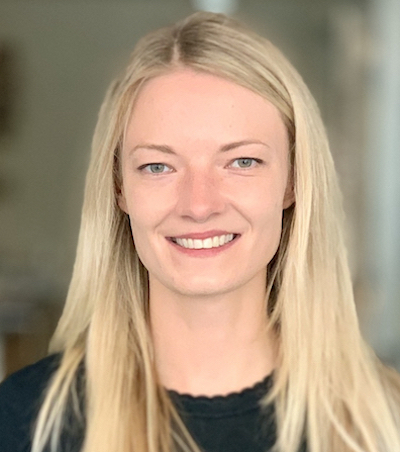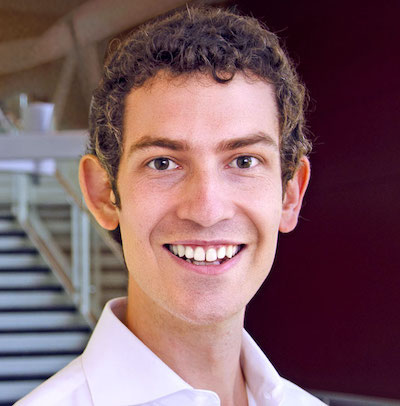UC San Diego Researchers Named Recipients of NIH New Innovator Awards
Published Date
Story by:
Media contact:
Topics covered:
Share This:
Article Content
Two early career researchers at the University of California San Diego have been named recipients of the 2022 National Institutes of Health (NIH) Director’s New Innovator Award from the NIH Common Fund’s High-Risk, High-Reward Research program. The program’s prestigious awards enable exceptionally creative scientists to push the boundaries of biomedical science through broadly impactful research.
Fleur Ferguson, an assistant professor in the Department of Chemistry & Biochemistry and the Skaggs School of Pharmacy and Pharmaceutical Sciences at UC San Diego, received a New Innovator Award. She leads an interdisciplinary chemical biology research group at UC San Diego and plans to use the funding awarded by the NIH Common Fund to take technologies and concepts learned from the field of targeted protein degradation (TPD) for cancer therapy and apply them to central challenges in neurodegenerative diseases, where TPD has yet to be applied broadly.

Ferguson believes this approach has high potential to yield significant advancement in both our understanding of the molecular mechanisms underlying neurodegenerative diseases, and in identifying new therapeutic strategies to treat them.
Johannes Schöneberg, an assistant professor in the Departments of Pharmacology and Chemistry & Biochemistry at UC San Diego, received a New Innovator Award, funded by the National Institute of General Medical Sciences. His newly formed research group at UC San Diego is pioneering four-dimensional (4D) cell biology. By combining stem cell-derived organoids, advanced microscopy and machine learning, the Schöneberg Lab is able to track the effects of diseases and drugs in all three space dimensions through time.

The New Innovator Award will allow Schöneberg to understand how changes in the morphology and dynamics of the 4D mitochondrial network cause abnormalities in stem cell renewal. Breakthroughs in this area could aid in the development of new therapies for cancer and intestinal disorders. By opening this new window into mitochondrial biology, Schöneberg believes that novel screening methods and treatment strategies can be developed that apply to the large number of diseases that are similarly related to mitochondria, such as epilepsy, Parkinson’s disease and Alzheimer’s disease.
“The science advanced by these researchers is poised to blaze new paths of discovery in human health,” said Lawrence A. Tabak, acting director of NIH. “This unique cohort of scientists will transform what is known in the biological and behavioral world. We are privileged to support this innovative science.”
Established in 2007, the New Innovator Award, part of the High-Risk, High-Reward Research program at the NIH, supports unusually innovative research from investigators who are within 10 years of their final degree or clinical residency and have not yet received an NIH R01 or equivalent grant. In this program, investigators are encouraged to think beyond traditional bounds and to pursue trailblazing ideas in any area of research relevant to the NIH’s mission to advance knowledge and enhance health. Each year, the Common Fund solicits applications, organizes rigorous peer-review of the proposals, selects recipients and oversees programs that pursue major scientific opportunities and gaps throughout the research enterprise that are of significant importance to NIH.
Ferguson and Schöneberg’s awards are two of 103 awards given nationally through the High-Risk, High-Reward Research program in 2022. In total, the NIH is expected to support the program with approximately $285 million from the institutes, centers, and offices across NIH over the next five years.
Funding for Fleur Ferguson’s project, Chemical Control of Misfolded Protein Fate, is provided by NIH Common Fund Grant DP2-NS132610. Funding for Johannes Schöneberg’s project, Decode Mitochondrial Morphology Dynamics to Predict Cell Fate Decisions, is provided by the National Institute of General Medical Sciences Grant DP2-GM150022.
About UC San Diego: At the University of California San Diego, we embrace a culture of exploration and experimentation. Established in 1960, UC San Diego has been shaped by exceptional scholars who are not afraid to look deeper, challenge expectations and redefine conventional wisdom. As one of the top 20 research universities in the world, we are driving innovation and change to advance society, propel economic growth and make our world a better place. Learn more at www.ucsd.edu.
You May Also Like
Engineers Take a Closer Look at How a Plant Virus Primes the Immune System to Fight Cancer
Technology & EngineeringStay in the Know
Keep up with all the latest from UC San Diego. Subscribe to the newsletter today.



